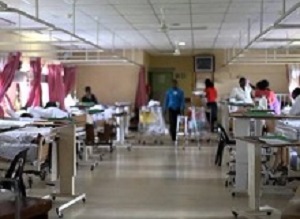
SA's public hospitals should be independent entities, removed from the control of under-skilled, understaffed and under-resourced provincial health departments, writes William Gumede of Wits University, in the Sunday Times.
Many large public hospitals under-perform because their boards, managements and staff have little control even over something as small as buying toilet paper, writes William Gumede, associate professor in the School of Governance at the University of the Witwatersrand in a Sunday Times report.
Gumede writes that there have been incidents of patients mistreated by staff, critical medicine shortages and maintenance failures but such incidents have to be reported by hospital CEOs to layers of authority in provincial health departments, or to an authority that does not have the power to act independently.
Gumede writes that public hospitals are the pillars of South Africa's public health system and large provincial public hospitals should be repositioned as standalone entities, reporting to the national Health Department and the National Treasury, and with independent boards.
He says public hospitals are complex. They have sophisticated assets, are skills intensive, and need to adhere to myriad medical regulations, standards and rules. Yet in many cases they report to under-skilled, understaffed and under-resourced provincial health departments.
Gumede says that in many cases the hospitals report to a junior director, who often has little capacity, experience or understanding of the job's demands. Such juniors might not have the authority to quickly get the attention of the head of the provincial health department or the health MEC if the hospital has an urgent problem, let alone reach the national health or finance minister in time.
Hospital strategy, equipment purchases and major appointments are often delayed because of administrative hoops. Boards, where they exist, often have little power. Provincial health departments can get qualified audits because of financial, operational and governance failures, but public hospitals can then get disclaimers.
The Treasury controls contract managements of large public hospitals. Individual hospitals send their requirements to provincial health departments, which send it to the Treasury. And, writes Gumede, there is often a mismatch, leading to delays in hospitals receiving critical supplies. The large public hospitals, with their funding, assets and staffs, should be standalone entities reporting to the national Health Department, the Treasury and Parliament and, he says, these hospitals must be audited annually as independent entities. Large public hospital budgets should come directly from the budget appropriations, rather than through provincial health departments.
Gumede writes that last year, the Office of Health Standards Compliance reported that only five out of 696 public health facilities met the 80% "pass mark" set by the Health Department. The Gauteng Health Department, in its 2017 annual report, said legal claims against the department for medical negligence sat at R21.96bn, just over half of the department's R40.2bn budget.
Gumede writes that as part of a turnaround plan for public hospitals, boards need to be strengthened and given more power, and they need to take financial responsibility. Boards must oversee strategy, financial performance, clinical quality and patient experience. He says most studies show that public hospitals with independent boards, with the necessary skills, competence and honesty, which hold hospital staff and management accountable, have shown consistently superior performances. Independent hospitals' boards should be made up of people with advanced technical and business skills, and of medical professionals and community representatives.
Hospitals must appoint competent, qualified and honest CEOs. Gumede writes that CEOs set the tone for the organisation. An ethical tone set by the CEO is likely to permeate through the hospital, and will help bring about organisation-wide ethical behaviour.
Gumede writes that the organisational culture, the shared ways of behaving, values and clinical practices by staff, management and contractors of public hospitals must become more professional, ethical and efficient. Much of the scandalous behaviour by nurses, doctors and health staff is because the organisational culture allows it to happen.
Professional organisations of nurses, doctors and other health-care professions must hold their members accountable. Similarly, public sector trade unions must hold their members accountable.
Gumede writes that in the midst of the collapse in responsible behaviour, explosion in corruption and breakdown in ethics, membership organisations, including trade unions, are crucial in holding their members individually accountable, and so stop the decline.
[link url="https://www.timeslive.co.za/sunday-times/opinion-and-analysis/2019-06-30-a-strong-cure-for-our-troubled-hospitals/"]Sunday Times report[/link]
